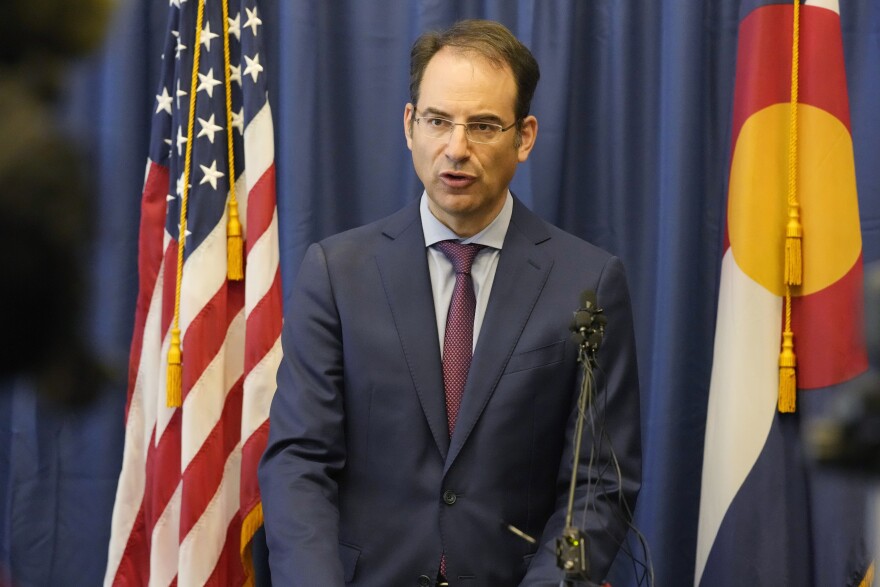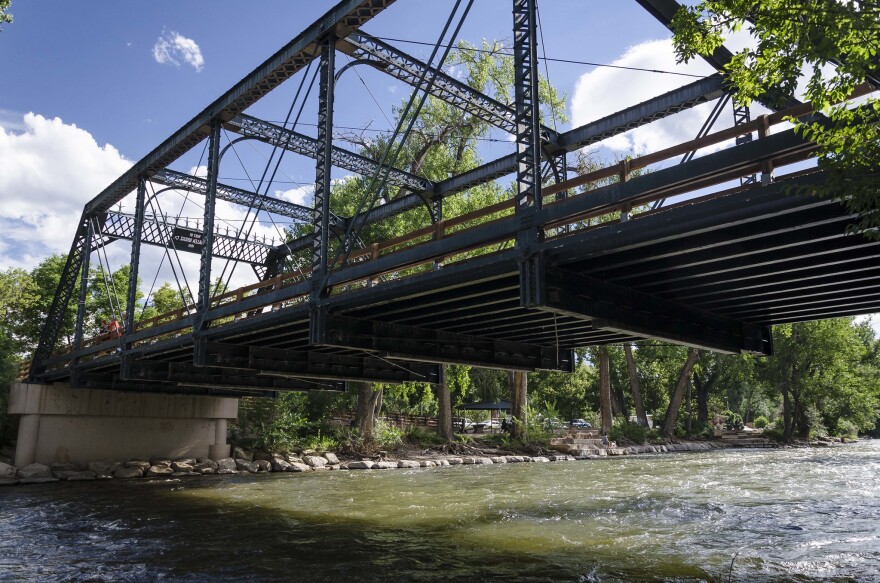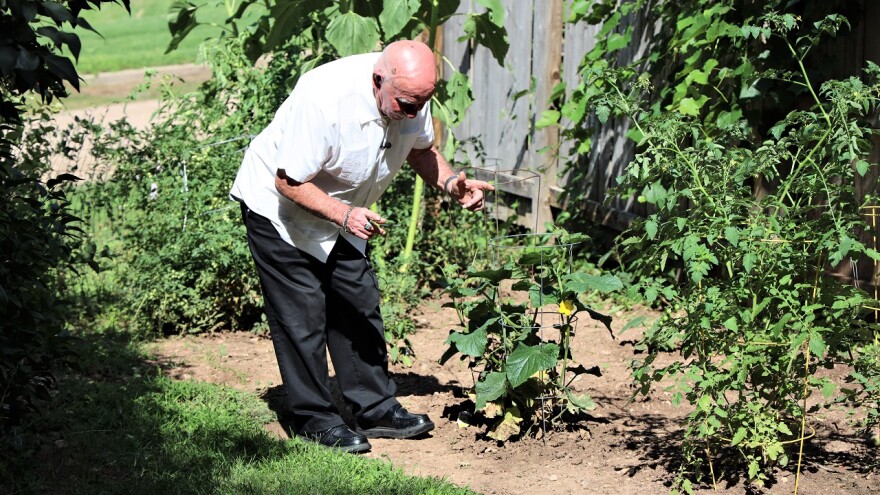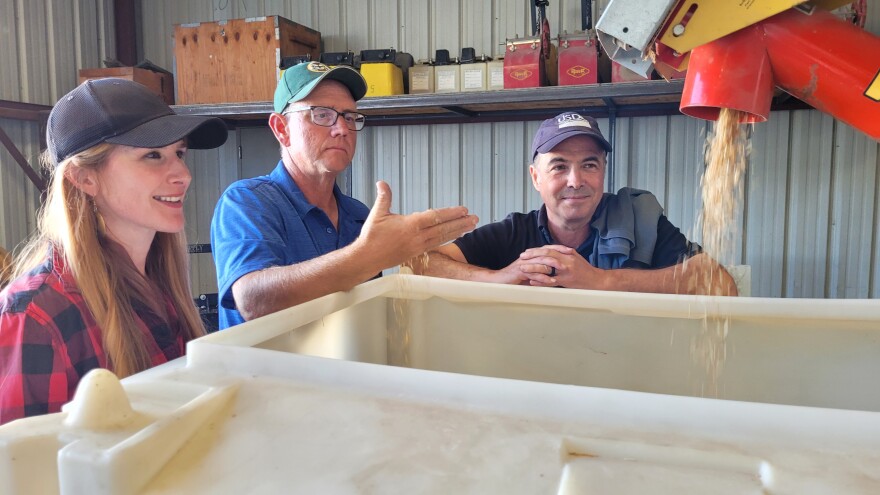Happy Friday from KUNC News! Here are a few of the most interesting stories from the week of July 21-25:
Shake up at the USDA will make Fort Collins a federal ag hub
Big changes are coming for the U.S. Department of Agriculture. On Thursday, U.S. Agriculture Secretary Brooke Rollins unveiled plans for a “complete reorganization of the USDA,” that will relocate about 2,600 USDA jobs in Washington, D.C. – more than half the local workforce - to five new regional hubs, including one in Fort Collins.
An official memorandum spelled out more details of the plan, which include shuttering Agricultural Research Service (ARS) area offices, consolidating the National Agricultural Statistics Service (NASS), shrinking the number of regional offices in the Forest Service and restructuring the Natural Resources Conservation Service (NRCS).
In addition to Fort Collins, four other regional hubs will be located in Raleigh, N.C.; Kansas City, Mo.; Indianapolis, Ind.; and Salt Lake City, Utah.

U.S. Rep. Gabe Evans misrepresented family’s immigration history
In defense of mass deportation, the pro-Trump Republican from Colorado has long said his grandfather immigrated "the legal way." Documents show otherwise.
The Fort Lupton Republican has talked many times about his grandfather, Cuauhtemoc Chavez, who was born in Mexico and earned U.S. citizenship through his Army service in World War II.
But Evans has mischaracterized the story of how his Depression-era ancestors achieved the American dream, and misstated key dates and details in his grandfather's biography, according to documents obtained by Newsline through archival research and government records requests.
Those records show that the Chavez family, and a young Cuauhtemoc in particular, were squarely on the wrong side of the "strong immigration policies" his grandson now invokes his name to champion.
In the weeks preceding publication of this story, Evans appeared to acknowledge or accept the assertion that his grandfather had entered the country unlawfully in at least two interviews. His office could not point to any examples of similar disclosures during the 2024 election or before.
Mountain West health groups ask states to act on extreme heat

With the anticipation of additional days of hot temperatures, more than 100 health organizations are calling on state leaders to take more action on extreme heat.
The organizations delivered a letter to the National Governors Association. It states, “The most effective way to prevent deaths and economic losses from extreme heat is to act before heat hits. State-level action on extreme heat is urgently needed to minimize the growing impacts and emergent risks.”
It also asks states to implement a handful of policies, including designating someone to lead the statewide response to extreme heat; labeling extreme heat an emergency to unlock more funds and resources; funding responses to heat; and tracking heat-related illnesses.
Colorado schools have a teacher shortage. Could an unusual apprenticeship program help close the gap?
The apprenticeships are being offered in public schools as part of a state program that offers an alternative path to gaining a teacher’s license and bachelor’s degree.
Proponents see the program as a partial solution to Colorado’s teacher shortage, which resulted in thousands of unfilled classroom positions last school year.
Teachers’ apprentices spend about four years getting experience in the classroom while taking courses on the side through Colorado Mountain College. It’s a different model from more traditional bachelor’s degrees that require years of coursework before setting foot in the classroom.
Advocates say it opens doors for those who find the traditional college route to becoming a teacher prohibitive due to lack of time and money.

Colorado's AG sues deputy, saying he illegally shared information with immigration agents
Colorado's Democratic attorney general on Tuesday sued a sheriff's deputy for allegedly helping federal immigration agents find and arrest a college student who had an expired visa.
Attorney General Phil Weiser also disclosed that his office is investigating whether other law enforcement officers on a regional drug task force the deputy worked on have been sharing information to help federal agents make immigration arrests in violation of state law limiting cooperation in immigration enforcement. The federal government has sued Colorado over such laws.
On June 5, Mesa County Deputy Alexander Zwinck allegedly shared the driver's license, vehicle registration and insurance information of the 19-year-old nursing student in a Signal chat used by task force members, according to the lawsuit.
Get top headlines and KUNC reporting directly to your mailbox each week when you subscribe to In The NoCo.
After federal immigration officers told him in the chat that the student did not have a criminal history but had an expired visa, Zwinck allegedly provided them with their location and told her to wait with him in his patrol car for about five minutes, asking about her accent and where she was born. He let her go with a warning and gave federal agents a description of her vehicle and told her which direction she was headed so they could arrest her, the lawsuit said.
Zwinck is also accused of violating the law again on June 10 by providing immigration officers with the photo of the license of another driver who had overstayed his visa, information about the person's vehicle and directions to help them arrest the driver.
The Mesa County Sheriff's Office declined to comment on the lawsuit. A spokesperson said the office is about a week away from finishing its internal investigation into the student's traffic stop and plans to issue a statement after it is finished.
What a veteran journalist learned from trying psychedelic therapy – and how it made his life better
Colorado recently hit a milestone: The first licensed psychedelic therapy clinic opened in June after voters here said magic mushrooms should be legal. So lots of reporters have written about the licensing process, interviewed therapists, and written about whether psychedelic mushrooms have real value in helping people recover from trauma, PTSD or other issues. At least one of those reporters took things further.
Robert Sanchez is a longtime writer for 5280 in Denver. He decided to try out psychedelic mushrooms and see if what the experts said about their therapeutic value held up. You can hear our interview with Sanchez here.

Two Mountain West states fall short of funding to maintain bridges and roads, report finds
A new report shows many states won’t have enough money to keep major roads and bridges in good repair over the next decade. Some states in the Mountain West are not immune to the problem, while others are ahead of the curve.
In all, 33 states fall short of the funding needed to maintain their bridges and roads over the next 10 years, according to a report by the Pew Charitable Trusts, a nonpartisan research group.
Michigan has the nation’s largest funding gap at $15.8 billion. In the Mountain West, New Mexico faces a funding gap of $2.9 billion, and Colorado has a shortfall of $1.4 billion.

Colorado’s dry, sunny climate can be tough on vegetable gardens. Here’s how to help yours thrive
If you decided to plant a vegetable garden earlier this spring, you’re probably already enjoying some of those home-grown tomatoes, zucchini, or peppers.
On the other hand, you may have decided that the potential benefits of growing your own food just aren’t worth the effort. Colorado’s intense climate, elevation and scarce rainfall make vegetable gardening a challenge. But there’s hope.
Cassey Anderson is a horticulture specialist with Colorado State University Extension whose mission is to help new gardeners succeed. CSU Extension has a number of helpful resources for gardeners, including a seasonal planting tip sheet and this vegetable garden guide. Hear from Anderson on how to help vegetables thrive here.
About The Catch-Up: Each week, KUNC collects and curates some of the more important stories of the week that have aired on our daily newscast. We know how busy life can be, and that it's not always possible to get your news on our airwaves (or from streaming us right here on our website). Fill in the gaps and catch up right here. No one enjoys the feeling of missing out!






